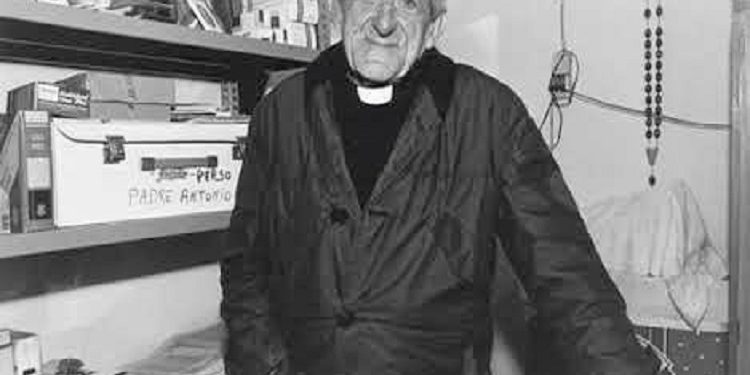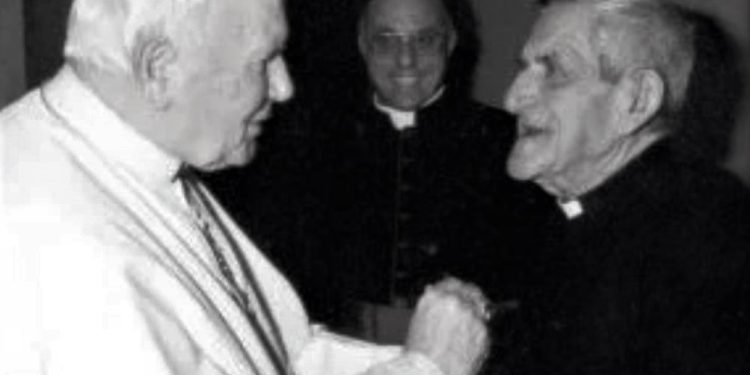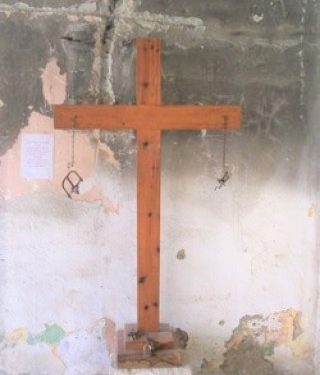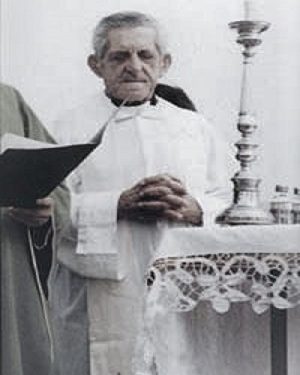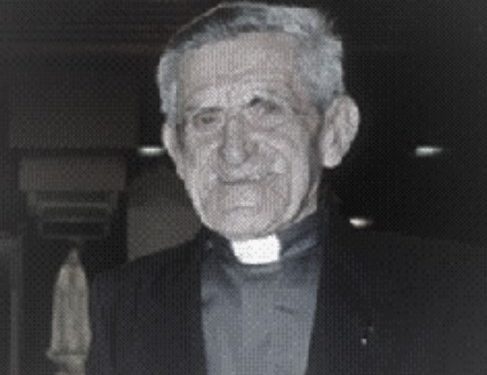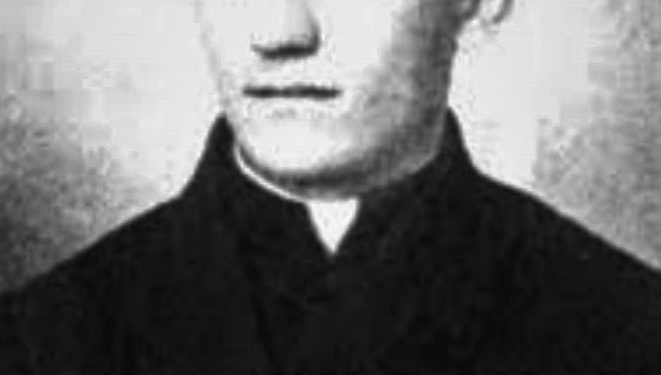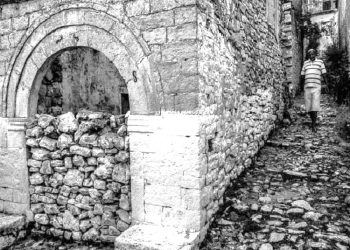Memorie.al / On March 9 we remember the anniversary of the death of Father Anton Luli, martyr and witness of Christ, Albanian Jesuit, (Lohe – Koplik, July 17, 1910 – Rome, March 9, 1998). Witness of the ordeal of the Albanians during the communist regime, on November 7, 1996, in the Vatican, on the occasion of the celebrations of the 50th anniversary of the priesthood of Pope John Paul II, the Jesuit, Father Anton Luli, made John Karol Vojtila cry, told the story of the martyrdom of the clergy and the Albanian people under the communist dictatorship, and the story of his personal suffering for Fè and Atdhè. So extraordinary was the life of the Albanian Jesuit, Father Anton Lulit that his fellow Jesuits around the world knew him as martyred, (dead) having no news of him for years, who was buried alive among the prisons and camps of concentration of the communist regime in Albania. Therefore, when they could meet him again, almost as if he had come out of the grave, they dedicated to him the book “Già dato per martire” (translated into Albanian with the title “Attë Lulin we knew the martyr”) – published in 1996 by Civiltà Cattolica. And he not only came out alive from the grave where the communists had locked him, but he also managed to celebrate the revival of the Church – seeing for himself the power of God’s Hand. It was precisely the heartbreaking testimonies of these years that Father Luli brought with him to his Jesuit brothers, when he finally came out alive from the grave and began to tell, so that todays and future generations do not forget what happened, to preserve freedom as the most important thing expensive, if they do not want to relive the tragedy of those who, even in the grave, have the marks of martyrdom on their bones.
Everyone outside Albania’s communist hell prison knew him dead. Moreover, the magazine “Albanian Bulletin Catholic”, in one of its numbers, published the photo of the priest, placing the note “Martyr for religion”, while another Italian newspaper “Avvenire” on November 2, 1983, published an article entitled “Histori of Father Luli”. 10 years later Father Çesar Gjiraudo (Cesare Giraundo), in Tirana for the first time was able to conduct a long interview on the stories of Father Anton Lulit S.J., the survivor of the communist regime.
Simplicity in communication and excellent command of the Italian language, made the interviewer Father Gjiraundo publish his memories in the book: “Gia dato Per Martire… I Fioretti di un gesuita albanese” (“Father Anton Luli S.J. We knew a martyr…”!) , printed at the “At Gjergj Fishta” Publishing House in Lezha. The book was translated by Gjergj Laca. The cover of the book has a photo of Father Anton Lulit S.J. with Pope John Paul II during the audience at His residence in the Vatican. The Pope was touching with His holy hands the living wound of a stoic martyr of the religion of Christ and Albania.
Life of a member of the Society of Jesus (Jesuits)
Katundi Lohe is located at the foot of the Albanian Alps, above Koplik i Përm. It is a small village, which is divided into two parts: Lower and Upper Lohja. Over the centuries, many brave sons have joined the freedom-loving wars against the Turks, showing bravery and great love for the lands of their ancestors. There were not a few Catholic clergy who came from this part of the province of the Great Highlands, who continued their studies at the Saverian College and the Franciscan Assembly in the ancient city of Shkodra, the early center of Christianity and national culture in Albania. In the small mountain village of Lohe, the child Anton was born.
He remembers the mother’s words to her friends, that the little boy was not in good health that he was very weak and always feared that he might leave this earthly life. He was the first child and two more were born after him. It was on St. Anthony’s day that the baby received the baptismal name he enjoys. At the age of 19, he began his studies at the Diocesan Seminary, or as it is known by all, the Apostolic School of the Jesuit Fathers. After the fifth grade in the gymnasium, he was sent to Goricje, to do the two years of the novitiate, where he completed the lyceum and philosophy until 1936.
Father Antonin, the superiors send him again to the Seminary of Shkodra, where he began to teach Italian, Albanian, history and geography. He stayed there for three years, one of which he spent in Tirana as a teacher. The superiors send him to study theology at the House of Saint Anthony in Kiev (near Turin), and he was ordained a priest on May 13, 1942. In 1943, he finally returned to Shkodër. The mother did not want her eldest son to become a priest and every day tried to convince him to stay at home and thus help him more at home.
Many years later, before she died, she told Father Anton’s brothers that she was happy that her son was serving Christ.
Religious services and the difficult road of calvary during communism
The situation in Albania, at the time of the communist barbarians, was very honorable. The communists, with beautiful words, were able to deceive the good part of the people, who were illiterate and did not know what communism was, and thus they became its victims. The Catholic clergy had always tried to open the eyes of the Albanian people, so that they would not be deceived by the deceptive ideology of communism.
Because of this, in many magazines and newspapers of the time, negative examples were brought, of the furious violence that communism had exercised and continued with fury against the countries where this ideology of hook and rope had become a destructive force. The former Soviet Union, which is run by the tyrants Lenin-Stalin, was the best example of the danger that threatened the democratic world and in particular Albania, which very quickly became a victim of the Marxist demagogues of the communist groups, which begin to sprout like mushrooms after the rain
After the occupation of Albania by the communist ideology and order, public arrests of political opponents of the regime began. It was the turn of the honest traders, who had succeeded in their small business through hard work and sacrifice. On the basis of Russian orientations, the frontal attack against religious institutions began, where the Catholic Church and the high hierarchy in the North West of Albania were placed at the epicenter of the Stalinist attacks.
But on the other hand, the anti-communist resistance was also strong. This was seen in the religious institutions and the prelates of the Church.
The manly attitude of the seminarian Mark Çuni, during the trial held against his superiors, the Jesuit fathers Father John Fausti S.J. and Father Daniel Dajani S. J.. The young seminarian student Çuni, defended his professors with dignity… The same gloomy panorama was unfolding in the French Assembly, where Fathers Gjon Shllaku and Father Çiprian Nikaj were shot by the black partisan squad.
This tragic fate was shared by the vast majority of vice-rectors, rectors and simple parish priests in clerical schools and parishes or dioceses, both in the city and in the village. Imprisonment of the vice rector of the Saint Francis Saveri College in Shkodra. During the time when the communists had started reprisals in Catholic clerical institutions and their religious and cultural centers, Father Anton Luli S.J. at that time he was a teacher and vice-rector of Saverian College in Shkodër.
He recalls: “In January 1946, all the Italians, fathers and brothers, left for their homeland. Only I remained in Shkodër together with Monsignor Frano Gjinin, who was the Apostolic delegate for Albania, in the absence of Monsignor Gjon Batista Nigris, who had been forbidden to enter again. Then Monsignor Gjini appointed me rector of the Saverian College and the Pontifical Seminary of Shkodra, a task that was not removed from me until 1991.
Perhaps no one has accumulated such important tasks for almost 50 years in a row…! When Father Fausti and Father Dajani were shot, on March 4, 1946, the seminary and college were closed. At that moment, a real army intervened, consisting of 8,000 communist partisans. These, after having defiled us in the dining hall of the seminary, made a fine check either in the seminary or in the college.
Then, without allowing us to go up to our rooms, they took us out, we and the seminarians only in the sheets we were wearing and nothing else. Everything was seized, including the seminary’s library with its 40,000 volumes, the largest and richest in all of Albania. To the few Albanians who were left, they told us: “Go to your homes, or go where you want.” The bishop then appointed me parish priest in the parish of Shkreli, thirty kilometers north of Shkodra.
First arrest and imprisonment (1947-1954)
Father Luli always lived with the anxiety that one day he would be imprisoned. The overwhelming majority of the clergy throughout Albania had succumbed to this bad fate, but the epicenter of the anti-Catholic and anti-Albanian attacks were concentrated in Shkodër and its highlands. For 18 months, Father Anton Luli S.J. was a parish priest among the faithful and generous mountaineers, brave and contemptuous of the atheist communist regime.
A week before Christmas 1947, the village priest is arrested by the partisan forces, on the grounds that he has developed “agitation and propaganda against popular power”. He was sent to the municipality of Koplik and suppressed for 8 months in a bathroom that had not been cleaned for a long time. It never saw the light of day. Then came the court process. In the court of Shkodra, he was sentenced to 7 years of compulsory labor, leaving the security prison in Koplik, which was a detention center for highlanders and Catholic clergy of those provinces. Inhuman tortures began on his fragile body.
The vice-rector recalls: “Now we are talking about torture. From the hospital where I was, I was called, one day, upstairs to the second floor, to the Security or Secret Service office. Four or five Security policemen had entered, who started they played with my body like a soccer ball, and they tired and crushed me until I fell to the ground. Then a man with big boots started jumping on my body until I felt a rib break.
Then the chief of police pounces on me and squeezes my throat so hard that it almost took my breath away. I remained like that, unable to move. Then, kicking and swearing, a policeman picked me up and took me back to my smelly cell.
When I was interrogated, I sometimes had to sit in the office with the chief of police from night to morning, constantly with my hands and feet tied behind my back. The police chief asked and I denied. Sometimes he was so tired that he fell asleep on the table. Then he would order a gendarme: “Take this… (a different word), take him down!”
During 24 hours, they didn’t give me more than 600 grams of bread… For eight and a half months in that environment where the gendarme, when he came to give me my ration, closed my nose because he couldn’t stand the bad smell, and threw the bread right there in the middle of excrement…” While on Christmas Eve, the chief of police sent Father Anton Lulin S.J. to another bathroom on the upper floor.
“There, in that bosom, he ordered me to undress, then tied a rope to a beam, shot it under my armpit, ordered me to stand on tiptoe and tied me in such a way that my body did not belong to the ground, but to remain suspended on the tip of the fingers.
It was Christmas Eve: A rainy and cold time. I stayed speechless for half an hour, maybe more, I don’t remember. Then I felt that my legs were rising and the cold was rising slowly until it reached my stomach. I started shivering, shaking and couldn’t stand any longer. I said to myself: “Death is certain,” for even a little and the cold were reaching my heart.
I screamed like a desperado. The chief of police felt angry: He shot me here below the knees. He understood that I was in danger; he untied me immediately and took me to his room. There was a small burning herd. I got on top of him and it took half an hour for my body to recover, it had suffered so much…”
Tortures more terrible than those of the Nazis…!
If the Nazi Gestapo executioners of the Second World War were still alive and read the memories and tortures he went through in the prisons of the communist hell, they would definitely say that our crimes are nothing compared to those of Enver Hoxha on the people own.
Father Zef Luli S.J., has gone through a real ordeal with torture and has survived like Christ, proving that religion and homeland are inseparable binomials of love, with which all those who have taken the beautiful path of craftsmanship have been fed since childhood.
Such tortures were used against the Jesuit priest, such as: electric current from the telephone, since there was no electric current in the torture room on his body. Often these wires were put on the phone, they were placed for 30 seconds in both his ears and the current penetrated to the brain, irritating the priest.
The other priest Dom Pjetër Çuni also had this bad luck, which died in torture as a result of the electric current in his body and mostly in his ears. Among the tortures, the parish priest of Boga, Dom Aleksandër Sirdani, also died and his body was thrown into the large pit of the gîrizi. For the nationalist women, the communist executioners used macochok (dac) torture, inserting them into their bodies and beating the macochok with a stick.
Father Luli remembers: “They told me that some people, because of hunger, came to eat their own excrement and drink their own urine to quench their thirst. These are things that cannot be forgotten…! They tied my hands and feet in the dark well big rats were jumping on my body and face. I couldn’t drive them out because my hands were tied and I was afraid they would eat my ears, my nose, reminding me that I was dead.
I was floor bound. They did this to tire me and push me to declare what they wanted. They had tied me tightly with wire. I still have the marks after 40 years. Around the joint was all living flesh. When they chose me for personal needs, my hands would bleed. Then they tied my hands in the same place, so much that a gangrenous wound was formed…”!/Memorie.al
(Taken from Vatican News)
The next issue follows




